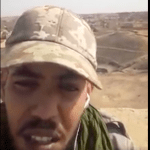
The saharawi homeland is occupied by Morocco. The conflict prevents the integration of North Africa. But the world has other interests and is swaying to Rabat’s line.
Julian Hilgers – tagesspiegel.de.- The Western Sahara conflict has developed from a territorial dispute into a conflict with international implications. Morocco is using its strategic interests in the region to move Germany and Spain to change course in their foreign policy.
It is only a short sentence on the website of the Federal Foreign Office. But it is a sentence of enormous diplomatic significance. In the dispute over Western Sahara, Morocco “made an important contribution to an agreement in 2007 with an autonomy plan”, it says since the end of August.
This sentence revived diplomatic relations between Germany and Morocco after an ice age. And these relations are needed. For Morocco and the territory of Western Sahara on the Atlantic, which is controlled by the Kingdom, play an important role for Germany’s strategic interests.
Morocco not only has large fish reserves, but also huge phosphate deposits and ideal conditions for the production of renewable energies. And above all, Morocco plays a decisive role in controlling the movement of refugees from the Sahel zone.
For this reason, Spain now also supports Morocco’s plan to make Western Sahara an autonomous region within the Moroccan state. But: “Autonomy clearly does not mean independent. The referendum has thus been pushed into the background,” explains political scientist and peace researcher Werner Ruf. And according to the United Nations, the people of Western Sahara have actually been entitled to this referendum on independence since 1963.
Violence on the rise again since 2020
One thing after the other: When the colonial powers divided up the African continent at the Congo Conference in 1885, Spain received the territory of Western Sahara. However, the Spanish colonial power delayed an independence referendum for years and only ceded the territory in 1975. However, not to the Saharawis, the population of Western Sahara, but to one third to Mauritania and two thirds to Morocco, which had been demanding an annexation of Western Sahara for many years.
While Mauritania ceded its share of Western Sahara in 1979, Morocco still occupies two-thirds of the territory today. The People’s Liberation Front of Western Sahara, the Frente Polisario, has been fighting Morocco and for independence and a referendum ever since.
Tens of thousands of Saharawis had to flee Western Sahara to neighbouring Algeria during this conflict. Although the United Nations reached a ceasefire in 1991, violence between Morocco and the Polisario has been on the rise again since 2020.
Under international law, Western Sahara is one of the clearest cases there is.
Werner Ruf, political scientist and peace researcher
The integration of the Maghreb states is also faltering because of the Western Sahara conflict. Relations between Algeria, which sides with the Polisario, and Morocco continue to deteriorate. While Morocco is moving closer to Europe again, Algeria is turning away from Spain and Germany.
Morocco also has the USA on its side
At least from a diplomatic point of view, Morocco has the better cards in the conflict. When the Moroccan government officially recognised Israel as a state in 2020, the USA, under then-President Donald Trump, confirmed Morocco’s sovereignty over Western Sahara.
Morocco’s pressure on Berlin and Madrid successful Blackmail and robust foreign policy pay off after all
The United Nations also continues to play a role. The mission for a referendum in Western Sahara (Minurso) launched in 1991 is considered a failure. Since last year, a new UN special envoy has been supposed to mediate between the different parties in the Western Sahara conflict and bring about peace.
But the internationalisation of the Western Sahara conflict makes a referendum a distant prospect for the people of Western Sahara. “It doesn’t look at all like a just solution that conforms to international law,” says Werner Ruf. “Under international law, Western Sahara is one of the clearest cases there is.” In practice, however, international interests seem to dominate.






